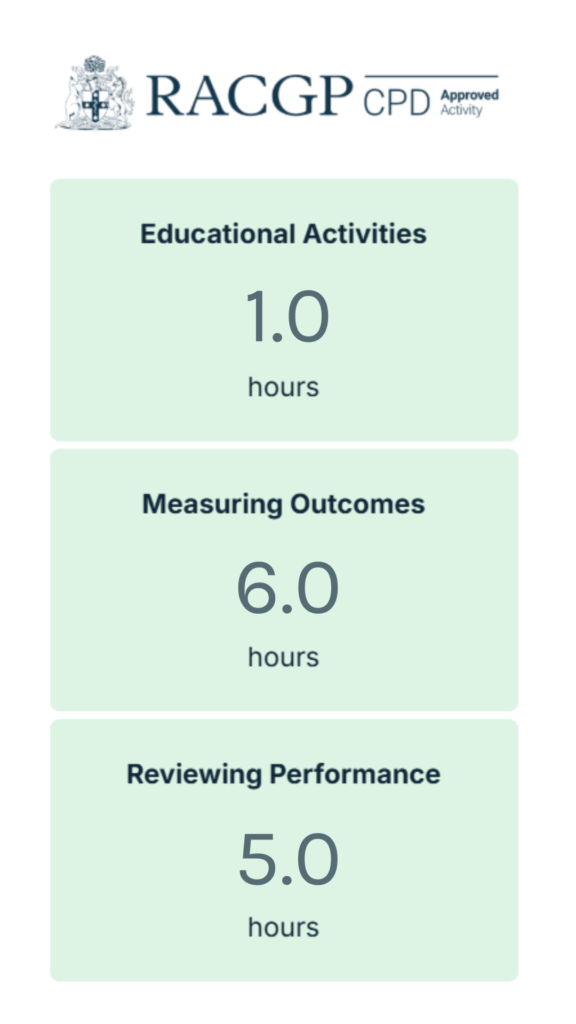Mini Audit for Chronic Kidney Disease (CKD) Screening
Empowering GPs to Improve Screening for Chronic Kidney Disease.
Did you participate in the Clinical Insights Pilot Program?
If so, you’re eligible to take part in this Mini Audit for Chronic Kidney Disease (CKD) Screening.
This mini audit identifies patients:
- who are at high risk of Chronic Kidney Disease (CKD), who have not had a guideline-recommended annual kidney health check, and/or
- with an abnormal eGFR and/or uACR who have not had a repeat test.
The aim of this mini-audit is to improve the rate of guideline-recommended CKD screening.
Note: The Clinical Insights pilot phase has now concluded, and an evaluation is scheduled for mid-2026. In the meantime, if you have any questions, please complete this form here.
On this page:
A new way to earn Measuring Outcomes CPD hours
This mini audit is part of the Clinical Insights Pilot Program which is designed in partnership with EMPHN, Monash University and Outcome Health.
This activity focuses on improving CKD screening based on evidence-based guidelines. By reviewing audit data, participating GPs will identify gaps in screening, compare their practice against peers, and implement actionable changes.
Earn 12 CPD Hours
Review 10 patients identified from your Clinical Insights report, to earn a total of 12 CPD hours (6 measuring outcomes, 5 reviewing performance, 1 educational activity).
Why participate?
Chronic Kidney Disease (CKD) is a significant health concern in Australia, affecting approximately 10% of adults, with a higher prevalence among Aboriginal and Torres Strait Islander peoples.1
Early detection and management in general practice are crucial to slow disease progression and reduce associated cardiovascular risks.1,2
The RACGP 2022 Curriculum and Syllabus for General Practice highlights the importance of kidney and urinary health as a key learning area, emphasising early detection, accurate diagnosis, and appropriate management of CKD.3
1. Chronic Kidney Disease (CKD) Management in Primary Care (5th edition). Kidney Health Australia, Melbourne, 2024.
2. Australian Bureau of Statistics. Australian Health Survey: Biomedical Results for Chronic Diseases. Canberra: ABS, 2013 (accessed 17 February 2025).
3. RACGP 2022 curriculum and syllabus for Australian general practice, Kidney and urinary health, 2022. (accessed 14 March 2025).

Learning outcomes
| 1 | Identify patients at increased risk of developing CKD who should be offered a kidney health check annually |
| 2 | Define risk factors for CKD, recognise how these can be better recorded in clinical software systems and develop ways to improve recording |
| 3 | Identify patients with abnormal pathology results (eGFR and/or uACR) who require repeat testing to confirm CKD diagnosis |
| 4 | Review audit data against peers to compare adherence to CKD screening and management guidelines and identify areas for improvement |
| 5 | Develop strategies to improve annual kidney health check rates in at risk patient population |
How do I earn my CPD hours?
| Complete the Mini Audit: Review 10 patients highlighted for review from your Clinical Insights report. Refer to the Mini Audit Instructional Guide here for step-by-step guidance. | |
| Review pre-filled information, complete mandatory fields and submit your findings via the EMPHN CPD Activity Submission and Evaluation Form. Submit your form here. | |
| EMPHN will approve hours and record with RACGP upon completion. |